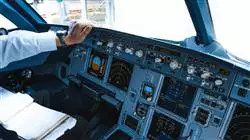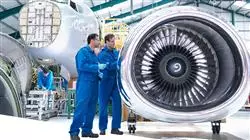University certificate
The world's largest faculty of engineering”
Introduction to the Program
You are only 450 hours away to perfect your knowledge of Aircraft Engineering and Air Navigation Systems. Enroll now”

From the identification of customer and operator needs, the design of the required systems to the final manufacturing process and authorization by the competent authorities, the aeronautical industry faces numerous challenges, where safety is of paramount importance. However, in recent decades it has taken on the new challenge of significantly reducing pollution, and new alternatives to traditional fuels have emerged.
A scenario in transformation that goes hand in hand with the evolution of Air Navigation Systems themselves, which have made it possible to improve the management of flight paths and large air traffic in a globalized world. In this sense, TECH has developed this Postgraduate diploma that brings together the most advanced syllabus on aircraft engineering in 450 teaching hours.
A syllabus with a theoretical-practical approach aimed at providing students with advanced learning about aircraft propulsion plants, manufacturing start-up, their maintenance, as well as the decarbonization process being carried out by companies. All this, in addition, with numerous didactic material based on video summaries, detailed videos, diagrams, complementary readings and case studies.
In addition, students are offered a flexible program that allows them to keep up to date whenever and wherever they wish. All you need is a digital device (cell phone, tablet or computer) with an Internet connection, which will allow you to view the content at any time of the day. Thus, with no classroom attendance or scheduled classes, this teaching is an ideal academic option for those seeking professional progression, while making a quality university program compatible with their daily responsibilities.
A 100% online Postgraduate diploma that adapts to your needs and allows you to self-manage your time to access the syllabus"
This Postgraduate diploma in Aircraft and Air Navigation Systems Engineering contains the most complete and up-to-date program on the market. The most important features include:
- Development of case studies presented by experts in Aeronautical engineering
- Graphic, schematic, and practical contents with which they are created, provide scientific and practical information on the disciplines that are essential for professional practice
- Practical exercises where the self-assessment process can be carried out to improve learning
- Its special emphasis on innovative methodologies
- Theoretical lessons, questions to the expert, debate forums on controversial topics, and individual reflection assignments
- Content that is accessible from any fixed or portable device with an Internet connection
The multimedia pills will give a greater agility to this teaching that will deepen the generation of mathematical models of calculation of the various aircraft engines"
The program’s teaching staff includes professionals from sector who contribute their work experience to this educational program, as well as renowned specialists from leading societies and prestigious universities.
Its multimedia content, developed with the latest educational technology, will provide the professionals with situated and contextual learning, i.e., a simulated environment that will provide an immersive education programmed to learn in real situations.
The design of this program focuses on Problem-Based Learning, by means of which the professionals must try to solve the different professional practice situations that are presented throughout the academic course. For this purpose, the students will be assisted by an innovative interactive video system created by renowned experts.
With the Relearning system you will achieve effective learning without the need to invest long hours of study and memorization”

Inquire about the most important advantages and disadvantages of each power plant at any time through this flexible academic option”
Why study at TECH?
TECH is the world’s largest online university. With an impressive catalog of more than 14,000 university programs available in 11 languages, it is positioned as a leader in employability, with a 99% job placement rate. In addition, it relies on an enormous faculty of more than 6,000 professors of the highest international renown.

Study at the world's largest online university and guarantee your professional success. The future starts at TECH”
The world’s best online university according to FORBES
The prestigious Forbes magazine, specialized in business and finance, has highlighted TECH as “the world's best online university” This is what they have recently stated in an article in their digital edition in which they echo the success story of this institution, “thanks to the academic offer it provides, the selection of its teaching staff, and an innovative learning method aimed at educating the professionals of the future”
A revolutionary study method, a cutting-edge faculty and a practical focus: the key to TECH's success.
The most complete study plans on the university scene
TECH offers the most complete study plans on the university scene, with syllabuses that cover fundamental concepts and, at the same time, the main scientific advances in their specific scientific areas. In addition, these programs are continuously being updated to guarantee students the academic vanguard and the most in-demand professional skills. In this way, the university's qualifications provide its graduates with a significant advantage to propel their careers to success.
TECH offers the most comprehensive and intensive study plans on the current university scene.
A world-class teaching staff
TECH's teaching staff is made up of more than 6,000 professors with the highest international recognition. Professors, researchers and top executives of multinational companies, including Isaiah Covington, performance coach of the Boston Celtics; Magda Romanska, principal investigator at Harvard MetaLAB; Ignacio Wistumba, chairman of the department of translational molecular pathology at MD Anderson Cancer Center; and D.W. Pine, creative director of TIME magazine, among others.
Internationally renowned experts, specialized in different branches of Health, Technology, Communication and Business, form part of the TECH faculty.
A unique learning method
TECH is the first university to use Relearning in all its programs. It is the best online learning methodology, accredited with international teaching quality certifications, provided by prestigious educational agencies. In addition, this disruptive educational model is complemented with the “Case Method”, thereby setting up a unique online teaching strategy. Innovative teaching resources are also implemented, including detailed videos, infographics and interactive summaries.
TECH combines Relearning and the Case Method in all its university programs to guarantee excellent theoretical and practical learning, studying whenever and wherever you want.
The world's largest online university
TECH is the world’s largest online university. We are the largest educational institution, with the best and widest online educational catalog, one hundred percent online and covering the vast majority of areas of knowledge. We offer a large selection of our own degrees and accredited online undergraduate and postgraduate degrees. In total, more than 14,000 university degrees, in eleven different languages, make us the largest educational largest in the world.
TECH has the world's most extensive catalog of academic and official programs, available in more than 11 languages.
Google Premier Partner
The American technology giant has awarded TECH the Google Google Premier Partner badge. This award, which is only available to 3% of the world's companies, highlights the efficient, flexible and tailored experience that this university provides to students. The recognition as a Google Premier Partner not only accredits the maximum rigor, performance and investment in TECH's digital infrastructures, but also places this university as one of the world's leading technology companies.
Google has positioned TECH in the top 3% of the world's most important technology companies by awarding it its Google Premier Partner badge.
The official online university of the NBA
TECH is the official online university of the NBA. Thanks to our agreement with the biggest league in basketball, we offer our students exclusive university programs, as well as a wide variety of educational resources focused on the business of the league and other areas of the sports industry. Each program is made up of a uniquely designed syllabus and features exceptional guest hosts: professionals with a distinguished sports background who will offer their expertise on the most relevant topics.
TECH has been selected by the NBA, the world's top basketball league, as its official online university.
The top-rated university by its students
Students have positioned TECH as the world's top-rated university on the main review websites, with a highest rating of 4.9 out of 5, obtained from more than 1,000 reviews. These results consolidate TECH as the benchmark university institution at an international level, reflecting the excellence and positive impact of its educational model.” reflecting the excellence and positive impact of its educational model.”
TECH is the world’s top-rated university by its students.
Leaders in employability
TECH has managed to become the leading university in employability. 99% of its students obtain jobs in the academic field they have studied, within one year of completing any of the university's programs. A similar number achieve immediate career enhancement. All this thanks to a study methodology that bases its effectiveness on the acquisition of practical skills, which are absolutely necessary for professional development.
99% of TECH graduates find a job within a year of completing their studies.
Postgraduate Diploma Aircraft and Air Navigation Systems Engineering.
Aircraft engineering is concerned with the design, construction and maintenance of aircraft and other air vehicles. Air navigation systems engineering, on the other hand, focuses on the design, development and management of systems and equipment used for aircraft navigation in the air and on the ground, including communication, navigation and surveillance systems. At TECH Global University we have this academic program designed with the objective of providing skills and knowledge necessary to design, develop, implement and maintain safe and efficient aeronautical systems.
Aircraft and air navigation systems engineering involves a process of designing, building and maintaining aircraft and navigation systems to ensure safety and efficiency in air transportation. You will learn about the design, construction and operation of aircraft, you will also learn about air navigation systems used in air traffic control. This university program is an excellent choice for those who wish to acquire specialized skills and develop a successful career in this field.







